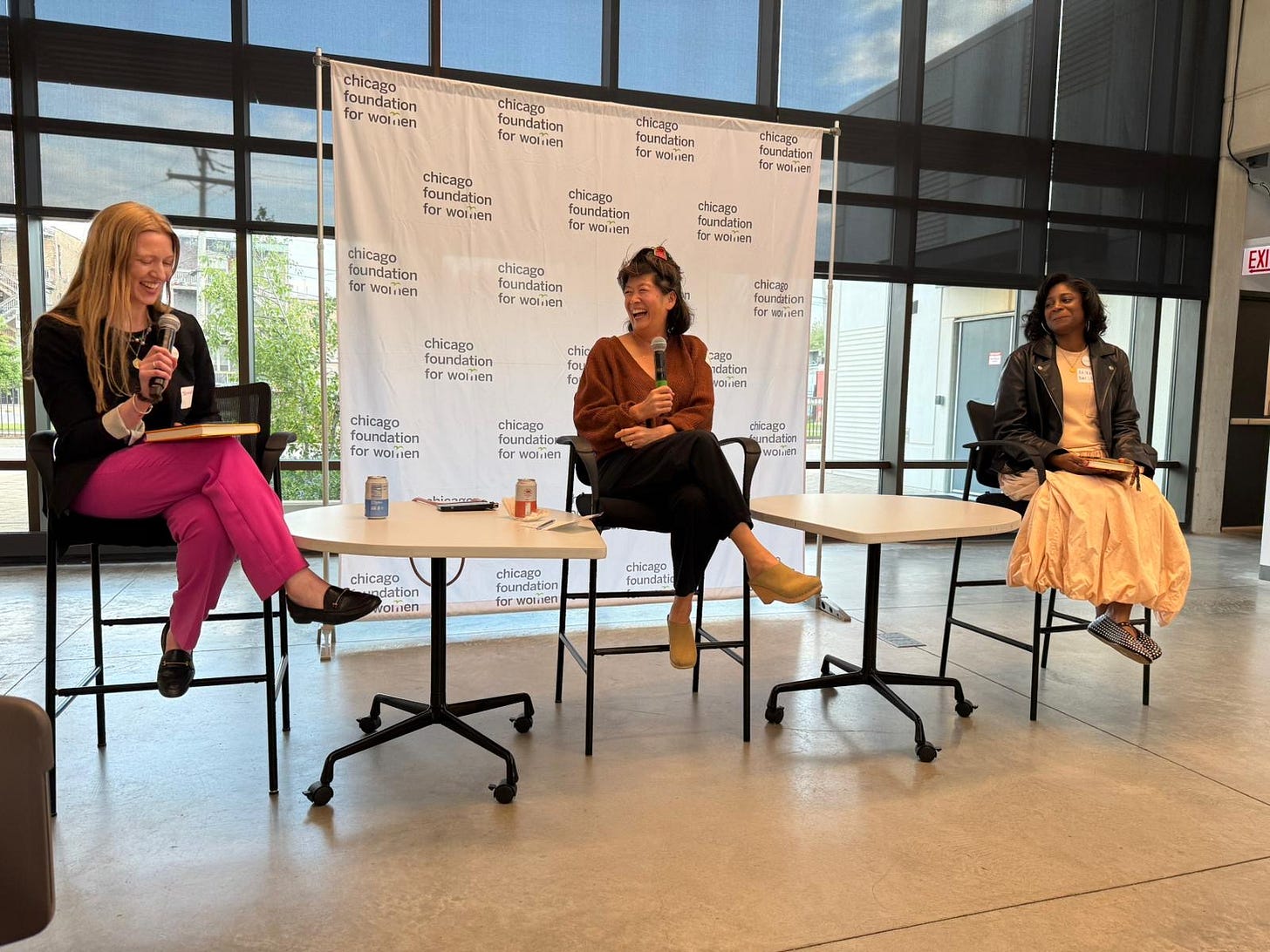“The Intersection” is your Monday, Wednesday, Friday briefing on global affairs, human rights, environment, social innovation, culture, and design—offering fresh insights through the lenses of sustainable development, women-centered perspectives, and emerging global trends. The aim? To keep you informed, curious, and always ready with a compelling conversation starter at the dinner table.
In today’s letter: SheIn is still looking for where to have an IPO, women’s FIFA World Cup is expanding, Italy’s underwhelming plan to curb exploitation in its fashion industry, participatory journalism from Lebanon, good climate news from China, lots of whales in San Francisco, the queen of Sri Lankan cinema dies, Alba de Céspedes resistance broadcasts, and much more.
I had the pleasure of co-interviewing the inimitable Hali Lee last night at a Chicago Foundation for Women event. A visionary in the collective giving space, Hali has spent decades reshaping what philanthropy can look like, starting with the Asian Women Giving Circle, which she founded in New York. Over twenty years, the circle has raised and distributed $1.5 million to Asian American women and gender-expansive artist-activists. She’s gone on to co-found the Donors of Color Network, help design Philanthropy Together, and lead her own consultancy, Radiant Strategies. This year, her trailblazing work earned her a spot on the TIME100 Philanthropy list.
Hali’s ethos is simple yet radical: philanthropy doesn’t belong to billionaires. It belongs to all of us. Her new book, The Big We, is part manifesto, part guidebook, a stirring invitation to reimagine generosity through the lens of community, shared resources, and collective action. Through personal stories and vibrant case studies (including her own giving circle), she lays out a more inclusive, grounded, and joyful future for philanthropy.
She’s also just a joy to be around. In our pre-event conversation and again last night, she radiated warmth, wisdom, and an optimistic spirit. We left feeling energized about what’s possible when ordinary people come together for a shared purpose. As Hali reminds us, Big Phil isn’t coming to save us. But small, committed communities? They just might.
“This is my dream: Imagine a world in which millions of citizens are engaged in thousands of groups, meeting in each other’s living rooms to put their heads and hearts together in order to better their neighborhoods and cities. They break bread together. They quarrel, listen, iterate, and learn together. They help each other out when someone is dealign with an ill parent or has a kid starting a new school. They volunteer, they vote, and they move money together.” - The Big We
Highly recommend The Big We if you're curious about giving circles, disillusioned with billionaire philanthropy, or in need of a reminder that change often begins with “normal” people choosing to care.
Our event wasn’t recorded, so here is another one of her speaking events for you to enjoy!
FIFA has announced that the Women’s World Cup will expand to 48 teams starting in 2031, a move that mirrors the newly enlarged men’s tournament and reflects the accelerating global growth of the women’s game. The United States is set to host the 2031 edition, followed by the UK in 2035, both of which are expected to be formally ratified soon. The expanded format will feature 12 groups of four and over 100 matches, requiring a broader network of host cities and venues. Meanwhile, FIFA has also approved a three-pillar strategy for Afghan women’s football, which includes the creation of a refugee team comprising evacuated players. The team will operate in a one-year pilot phase, participating in FIFA-sanctioned friendlies and tournaments, and offering a rare platform for athletes banned from official competition under Taliban rule.
“The end of a war is not the end of the story.” On 27 November 2024, a ceasefire between Israel and Hezbollah brought an official end to over a year of conflict in Lebanon (though not before three months of relentless Israeli airstrikes and a ground invasion displaced more than a million people and left around 4,000 dead, many of them civilians). On the first day of the truce, families flooded back to southern Lebanon, horns blaring in tentative celebration, only to find their villages reduced to rubble and the future marked by deep uncertainty. Half a year on, some 90,000 people remain displaced. In a new participatory journalism project by The New Humanitarian, ten individuals—Abu Ali, Abbas, Hassan, Leo, Nour, Ragida, Riham, Robert, Zahraa, and Yasmina—share their stories of survival and upheaval. Their accounts, told in words, photos, and videos, reveal the true nature of displacement and the emotional toll of being uprooted by war. Well worth spending some time reading through their diaries.
“The feeling of leaving is like tearing your sould form your body. You have to leave everything behind, but you want to take everything with you. You have to get to safety, but for you the safe place is the one you left behind.” - Nour, 28.
In a move that has sent shockwaves through the global medical research community, US health secretary Robert F Kennedy Jr has threatened to ban federally funded scientists from publishing in top-tier medical journals (including The Lancet, JAMA, and The New England Journal of Medicine) calling them “corrupt” and beholden to pharmaceutical interests. Instead, he has proposed the creation of state-run alternatives that would, he claims, restore scientific integrity and elevate NIH-funded researchers as arbiters of legitimacy. The comments, made on a podcast, follow sweeping cuts to NIH funding and a mass purge of public health staff. Critics warn the policy could erode the credibility of American science and isolate it from the global research community.
If I were him, I might be more concerned with his own team's credibility. This week’s much-touted MAHA Report—intended as a cornerstone of the administration’s health agenda—quickly drew scrutiny for its apparent reliance on AI-generated research. Of the 522 footnotes in the version sent to The Washington Post, at least 37 were duplicated, several cited non-existent studies, and others misattributed authors. A number of links featured the prefix “oaicite”—a telltale marker of content generated using OpenAI tools, raising further questions about the report’s rigor and the administration’s approach to evidence-based policymaking. What a joke.
Y’all…CEO compensation at S&P 500 companies jumped nearly 10% in 2024, with the median package reaching $17.1m, driven largely by stock awards tied to performance as profits soared and markets rallied. Top earners included Axon’s Rick Smith ($164.5m), GE Aerospace’s Lawrence Culp, and Apple’s Tim Cook, whose pay is similarly tethered to long-term targets. At half the companies surveyed, the average employee would need nearly two centuries to match their CEO’s annual income. Women made modest gains in the top ranks, with median pay rising 10.7% to $20m, though experts caution that broader equity remains elusive as DEI initiatives lose steam. Security perks are also on the rise—perhaps a sign of the times.

Shein, the China-founded fast-fashion giant now headquartered in Singapore, is preparing to file for an IPO in Hong Kong after its planned London listing stalled due to delays in Chinese regulatory approval. Despite securing the UK’s FCA nod, the China Securities Regulatory Commission has remained silent, prompting Shein to pivot to Hong Kong with hopes of listing by year’s end. The move marks a shift from its earlier efforts to establish itself as a global brand via Western markets. Mounting scrutiny over alleged links to Xinjiang cotton, a looming NGO challenge, and shifting global trade policies—including the end of the U.S. de minimis exemption—have further complicated its plans. While a Hong Kong listing may undercut Shein’s global ambitions, a rebound in the local market and recent blockbuster IPOs suggest the city could still provide a viable stage.
Still, the company is building a high-profile defence across Europe, enlisting a roster of seasoned political insiders to safeguard its interests. In France, the fast-fashion giant has tapped former Interior Minister Christophe Castaner and lawyer Nicole Guedj, a former secretary of state. Meanwhile, in Brussels, it counts on the influence of Günther Oettinger, the former European Commissioner.
After a year of negotiations, Italy has unveiled an underwhelming plan to curb worker exploitation in its fashion industry. Signed by fashion industry bodies, trade unions, and regional authorities, the non-binding agreement follows a string of investigations exposing abusive labour practices in workshops producing for top luxury labels. Italy, which accounts for roughly half of global luxury production, has faced mounting scrutiny after Milan prosecutors uncovered operations employing underpaid, often undocumented workers to craft goods for brands like Dior and Armani. The new memorandum, proposed by a Milan court, calls for the creation of a centralised supplier database that tracks tax, labour, and social compliance; however, participation remains voluntary. And, it only covers Lombardy, where Milan is located. I'm not sure that will make much of a difference…
Turns out sustainability practices are good for business. A recent study by NYU Stern and Deloitte found that nearly 80 percent of food and agriculture firms investing in sustainable practices reported revenue growth, and over 70 percent saw cost reductions. Despite carrying price premiums, sustainable products are growing faster than conventional ones, driven by increasing consumer demand and innovative supply chain practices. From reducing food waste to investing in eco-packaging, businesses are co-investing across the value chain, demonstrating that regenerative agriculture and responsible sourcing aren’t just beneficial for the planet.

In Salta, Argentina, women are steadily entering the construction sector, driven by training programs and gender quota laws that challenge the traditionally male-dominated industry. Despite persistent stereotypes and a national labour gap (women earn up to 35.7% less in unskilled sectors, such as construction), the program has trained over 1,100 women since 2022, supported by municipal quotas that require at least 10% female participation in public works. The local union, UOCRA, has complemented these efforts with gender equality workshops and training, further integrating women into the industry. While national support waned after the 2024 closure of Argentina’s Ministry of Women, local initiatives persist, proving that dismantling cultural barriers and providing opportunities can transform lives. Women not only gain economic independence but also shift social perceptions, earning respect on construction sites and pride at home. Salta’s pioneering model is inspiring similar policies nationwide, signalling a gradual but meaningful redefinition of gender roles in Argentine labour markets.
Milwaukee may be known for its breweries and bratwurst, but it’s also become one of America’s most cutthroat rental markets. With 94% of units occupied and eight renters vying for each apartment, the city’s low housing supply, exacerbated by sluggish post-2008 development and soaring construction costs, is squeezing renters across generations. Here is a recent travel guide if you are curious about what else the city has to offer.
San Francisco is seeing a shockingly high number of whales in the Bay. 33 gray whales have been sighted this year compared to only four last year! And they are sticking around for longer. (It’s probably because they aren’t getting enough to eat in the Arctic.)

My bookshelves contain a couple of Alba de Céspedes books that have yet to be read. I might get to them quicker after reading this piece. During the Second World War, the Italian-Cuban writer traded fiction for resistance, fleeing occupied Rome and surviving in the countryside before making her way across the German front line to Allied-held Bari. There, she joined Radio Bari (then the voice of free Italy) and became the director of L’Italia Combatte!, a program that broadcast wartime news, resistance updates, and morale-boosting messages to a fractured nation. Twice a week, under the pseudonym Clorinda, she spoke to her country. The New Yorker article shares three of them, translated into English for the first time, that address the women of Italy, whose husbands were often taken away in the middle of the night.
Thousands gathered in Colombo to bid farewell to Malini Fonseka, the queen of Sri Lankan cinema, who died on 24 May at 78. Over five decades and more than 140 films, Fonseka brought depth and quiet strength to the roles of women navigating love, loss, and patriarchy, becoming a feminist icon in the process. From Nidhanaya to Eya Dan Loku Lamayek, she portrayed women with dignity and defiance, expanding what female characters (and actresses) could be. A trailblazer behind the camera and later in politics, her influence stretched far beyond the screen. “She’s the queen. That’s it,” one mourner said.
We usually focus exclusively on women artists here, but I couldn’t resist sharing this gem from The Guardian’s “My Best Shot” series, which features photographers discussing their most iconic images. I immediately recognized the pink man with the shopping cart—an image that’s lingered in my memory since I bought a postcard from that series in Bali back in early 2014. Once you see it, you don’t forget it: a fluorescent pink figure with his shopping cart, set against quiet, natural landscapes.
9 night sky events to see in June, from a strawberry moon to interstellar clouds. I often feel as though I hear about these things after they have happened, so thank you, National Geographic, for helping me stay prepared. I might actually add the "Well-Placed" Globular Cluster to my Google Cal for June 2nd.
I’ve long admired Yiyun Li’s work, and her latest is high on my reading list. Things in Nature Merely Grow is a quietly devastating meditation on grief and endurance, written after the unimaginable loss of both of her sons to suicide. Composed, in her words, “at the centre of a hurricane,” it’s a book of startling presence, less a recounting of tragedy than a testament to survival. The Guardian’s Suzanne Joinson calls it a work that “offers comfort from the abyss”—and I can’t think of higher praise.
An ode to Audra McDonald, whom Time calls “Our Greatest Living Stage Actor.” At 54, she holds the record for the most Tony Awards ever won by a performer and remains the only person to have taken home a Tony in all four acting categories. With her 11th nomination announced this May, she became the most Tony-nominated performer in history. She’s currently commanding the stage as Mama Rose in Gypsy on Broadway. What do they say, everything’s coming up roses?

Thank you for reading! Please share with an interesting and interested person in your life. xxx







